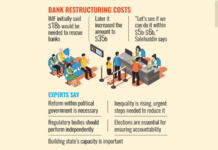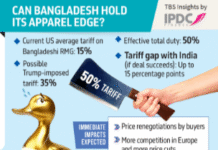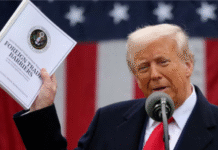
The government will provide 15 per cent cash subsidy to rice exporters for the first time in the country’s history with the view to encouraging shipment of the surplus grain.
Millers, who process rice from locally grown paddy, will be eligible for the cash subsidy on their earnings from export, according to a Bangladesh Bank notice yesterday.
“This subsidy will be instrumental in making locally grown rice competitive in the global market,” said Anup Kumar Saha, deputy executive director of consumer brands at ACI, which has four automatic rice mills.
The announcement comes at a time when the prices of the staple are rising, prompting the food ministry to form seven committees to monitor the market and stave off unusual price hike.
The teams will visit wholesale markets in the Dhaka metropolitan area to check prices of rice and flour and submit reports in this regard, the food ministry said on Wednesday.
The prices of all varieties of rice have been on the rise since January 26, according to data compiled by the Trading Corporation of Bangladesh (TCB).
For instance, the average prices of coarse rice consumed mainly by low-income people rose 3 per cent to Tk 33.5 each kilogram in the markets of Dhaka from Tk 32.5 a week earlier.
However, the prices still remain below last year’s levels, according to the state-run TCB.
The cash subsidy has been declared upon recommendations from the finance and commerce ministries, said a central bank official.
Earlier, a commerce ministry report had suggested incentive for rice export against the backdrop of higher production than local demand in fiscal 2018-19.
Bangladesh had surplus rice of 34.95 lakh tonnes last fiscal year after production hit 3.73 crore tonnes, according to the report.
Amid the production glut, rice millers had been demanding export subsidy. But the government imposed 62.50 per cent import duty in a bid to help farmers offset losses caused by price decline.
Exporters who want to get the cash subsidy will have to take prior permission from the commerce ministry and obtain certificates from the customs department, said the Bangladesh Bank notice.
Millers using duty-free packaging materials for rice export will not be entitled to the subsidy.
Banks will have to preserve all subsidy-related documents for three years so that the BB or other authorities can verify the export if necessary.
The central bank will debit the amounts from banks if the subsidy is provided illegally. Stern actions also will be taken against officials involved in malpractice, according to the notice.
KM Layek Ali, general secretary of the Bangladesh Auto Major and Husking Mills Association, welcomed the government move as exports have become necessary as production now exceeds demand.
“Due to the subsidy, we will become competitive in the international market,” he said.
Locally grown rice has so far been uncompetitive in the international market because of low prices from India, a leading exporter, according to Saha.
The incentive will encourage millers to buy paddy, which will also help raise prices at the farm gates, Ali said, adding that the export subsidy will not lead to abnormal spiral in prices.
The government had earlier slapped a ban on the export of parboiled rice but softened the stance last year, when it gave private operators the go-ahead to ship nearly one lakh tonnes abroad in the face of falling prices in the local market.
However, the private sector has long been exporting aromatic rice based on approvals from the commerce ministry.
The government move will help increase the overall export earnings that are now witnessing sluggish growth, the BB official said.
Export earnings fell 5.84 per cent year-on-year to $19.3 billion in the first six months of the fiscal year.
The receipts between the months of July and December last year were also 12.77 per cent lower than the half-yearly target of $22.12 billion, according to data from the Export Promotion Bureau.









